BDW 2025 – Fókuszban a hazai márkák
Az Óbudai Egyetem Rejtő Sándor Könnyűipari és Környezetmérnöki Karának Terméktervező Intézete idén is csatlakozik a Budapest Design Week 2025 eseménysorozathoz.
Az intézet „Fókuszban a hazai márkák” című előadásán sikeres magyar designmárkák képviselői mutatják be szakmai útjukat, tapasztalataikat és legújabb projektjeiket. Az esemény célja, hogy inspirációt nyújtson a fiatal tervezőgeneráció számára, valamint bemutassa a hazai designipar sokszínűségét és innovatív megoldásait.
Előadók:
Antalóczy Zsófia – Tomcsányi
Varró Zoltán , Almási Bálint és Szloszjár Dávid – Varródesign
Dávid Nóra – ECONOR DESIGN KFT.
Jónás Anna – ANNAJONAS
Légrádi-Argay Nóra – INK by Argay Nóra
Időpont: 2025. október 16. 16:00 csütörtök
Helyszín: ÓE RKK 1034 Doberdó út 6. Schmalz terem /Előadó II.
Intézetünk diplomás hallgatója 2. helyezést ért el országos betonpályázaton
English version below
A beton.hu, a CeMBeton és a MABESZ országos hallgatói pályázatot hirdetett „Minden építés alapja 2025 – Betonpályázat” címmel, két kategóriában: Betonépítés, építészet és Anyag- és előállítási technológia. A díjátadóra 2025. október 3-án, a Dürer Kertben megrendezett Beton Fesztiválon került sor.
A „Betonépítés, építészet” kategóriában Gyémánt Anett Csenge, az Óbudai Egyetem Rejtő Sándor Könnyűipari és Környezetmérnöki Kar Terméktervező Intézetének hallgatója 2. helyezést ért el „Kültéri ülőbútor tervezése” című diplomamunkájával. Témavezetője Dr. Hottó Éva, egyetemi adjunktus volt.
A zsűri kiemelte a dolgozat ergonómiai megalapozottságát, a kreatív anyagkísérleteket, valamint a beton könnyed és formailag kifinomult alkalmazását. A munkát különlegessé teszi, hogy az ülőbútor felületén a Városliget térképe jelenik meg betonlenyomat formájában.

Gyémánt Anett Csenege
Gratulálunk Anettnek és témavezetőjének a kiemelkedő szakmai eredményhez!
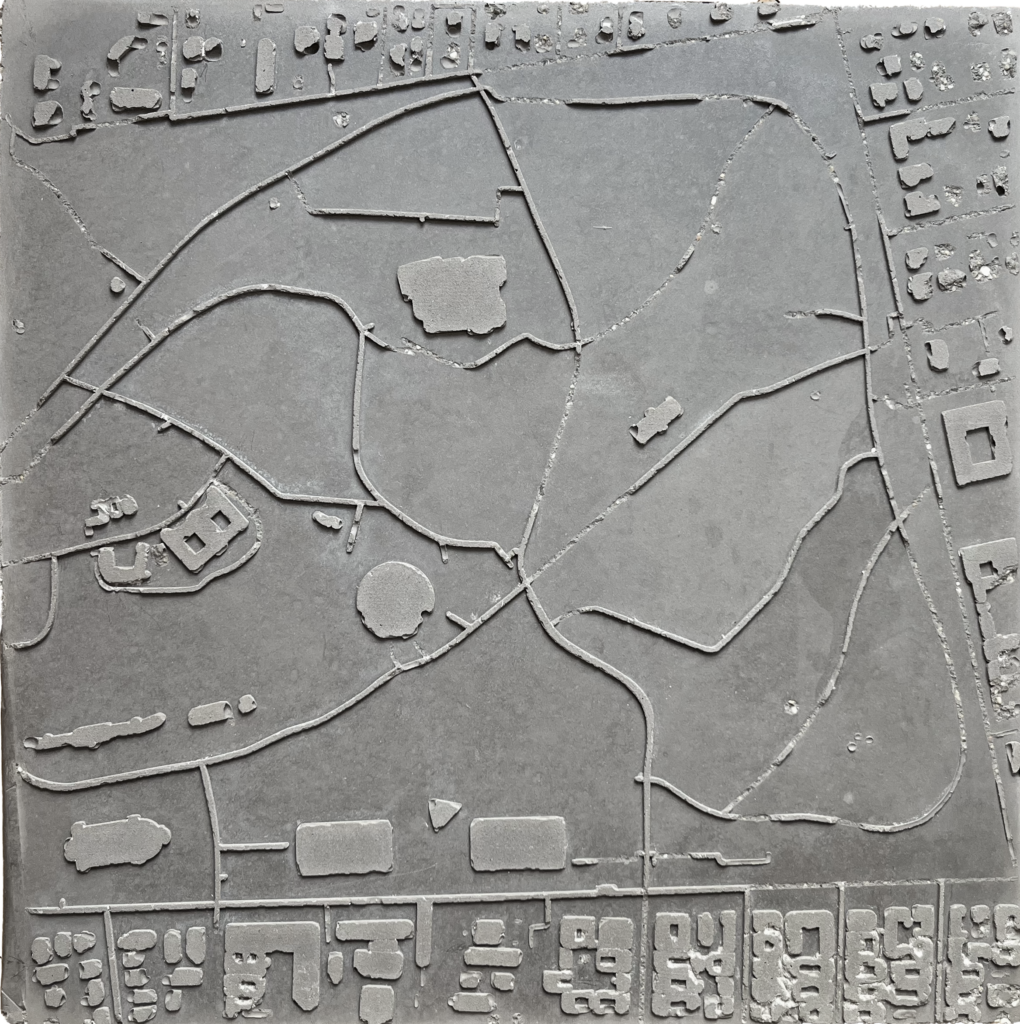
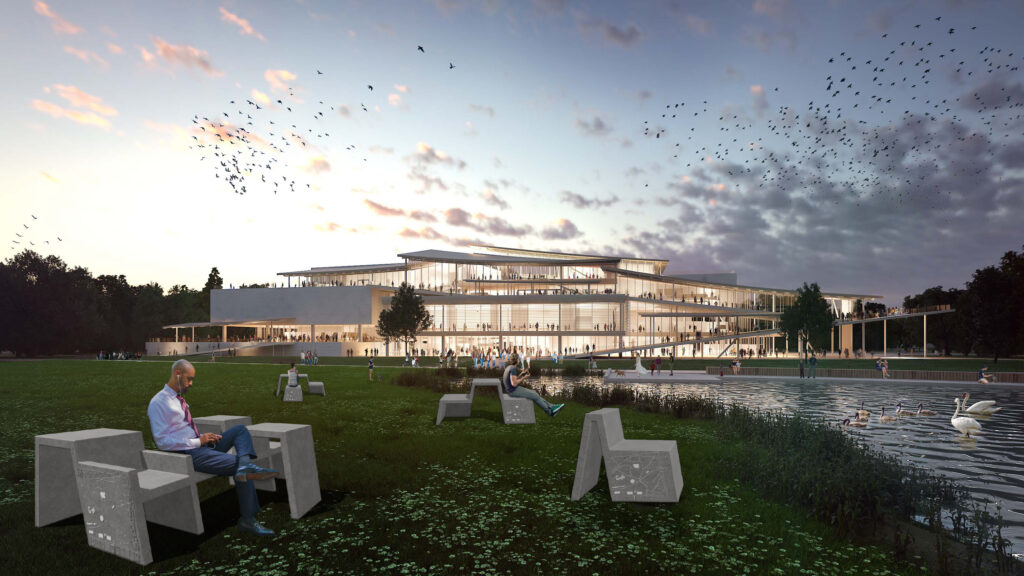
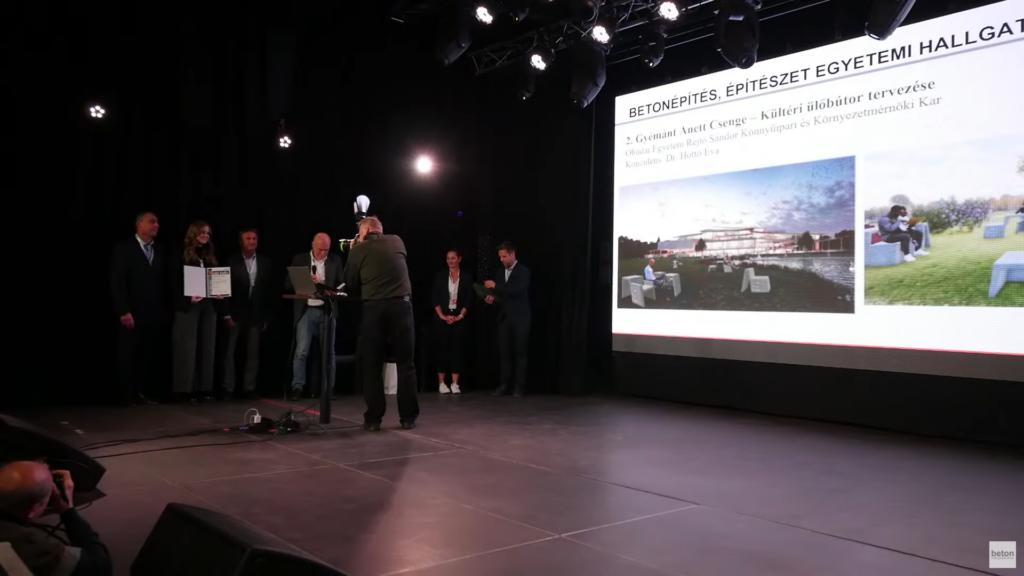
A díjátadó pillanatképe – Gyémánt Anett Csenge, 2. helyezés (Forrás: az esemény YouTube videója)
Our institute’s graduate student achieved 2nd place in the national concrete design competition
The national student competition “Foundation of All Construction 2025 – Concrete Competition”, organized by beton.hu, CeMBeton, and MABESZ, was held in two categories: Concrete Construction and Architecture and Material and Production Technology.
At the awards ceremony, which took place on October 3, 2025, during the Concrete Festival at Dürer Kert (Budapest), Anett Csenge Gyémánt, a student of the Product Design Institute, Rejtő Sándor Faculty of Light Industry and Environmental Engineering, Óbuda University, won 2nd place in the Concrete Construction and Architecture category with her diploma project “Design of Outdoor Seating Furniture.”
Her supervisor was Dr. Éva Hottó, Assistant Professor.
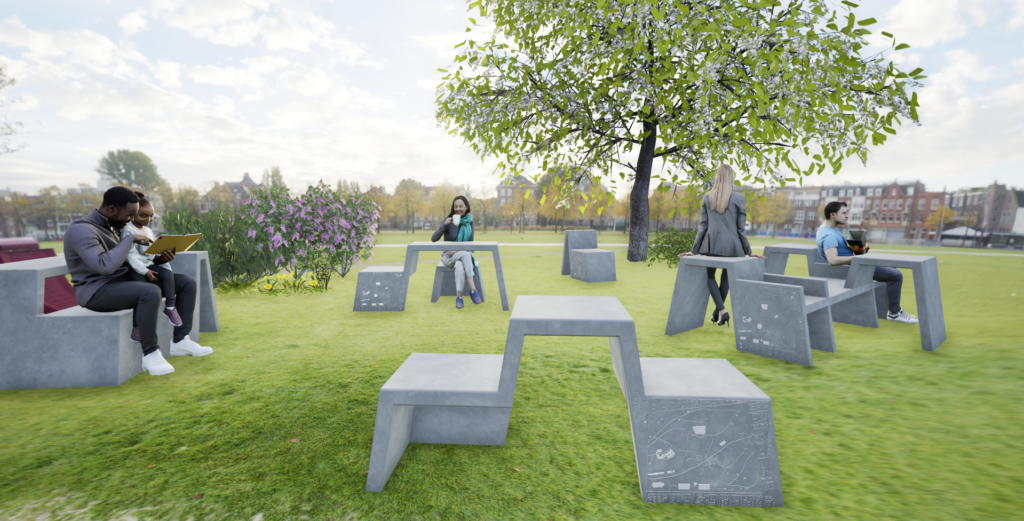
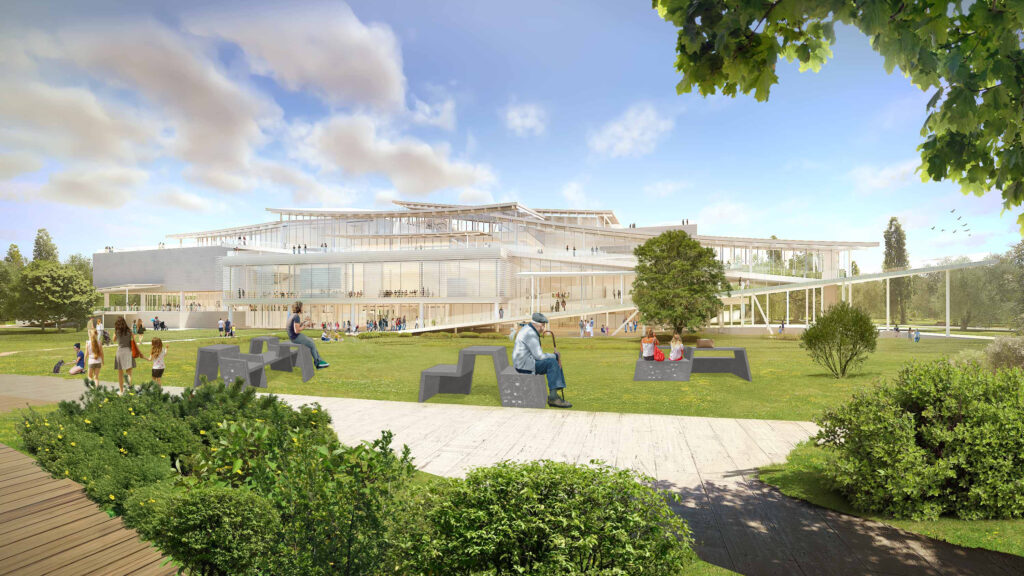
The jury praised the project for its ergonomic foundation, creative material experimentation, and the elegant, lightweight use of concrete. A distinctive feature of the design is that the seat’s surface incorporates an imprint of the City Park’s map.
Congratulations to Anett Csenge Gyémánt and her supervisor for this outstanding professional achievement!
Forrás: YouTube – Beton Fesztivál 2025/2
Hybrid Design Cultures Laboratory (HyDeC Lab)
Tevékenységek
A Hybrid Design Cultures Lab a hagyományos kézműves és a mesterséges intelligencia által támogatott digitális tervezési gyakorlatok integrációját kutatja.
A kutatócsoport célja új esztétikai nyelvek és fenntarthatóbb designmodellek feltárása a klasszikus hagyományok és az innovatív technológiák ötvözésével.
| Kapcsolattartó: Tóthné Némethy Virág Beosztás: Intézeti mérnök, doktori hallgató Cím: Budapest, Doberdó út 6. Magyarország Elérhetőség: nemethy.virag@uni-obuda.hu Weboldal: http://tti.rkk.uni-obuda.hu/hydeclab |
Interdiszciplináris megközelítése révén egyszerre vizsgálja a tervezés technológiai, kulturális és pedagógiai aspektusait, hozzájárulva az ember és MI közötti összehangolt együttműködés kialakításához a kreatív iparban.
K+F tevékenység
- Hibrid design modellek fejlesztése a mesterséges intelligencia és kézműves technikák integrációjával
- Digitális és manuális tervezési folyamatok összehasonlító elemzése
- Fenntartható kollekciók létrehozása hibrid tervezési módszerekkel
- MI-alapú trendkutatás és designpedagógiai modellek kidolgozása
Fő tevékenységi terület
• Mesterséges intelligencia és kézművesség integrációja a designkultúrában
• Fenntartható és digitális design modellek fejlesztése
• Oktatási és kutatási programok az MI-alapú tervezés területén
Kulcs kompetenciák
• Interdiszciplináris designkutatás
• Mesterséges intelligencia alkalmazása a kreatív iparban
• Oktatás, workshopok és kutatási projektek tervezése
• Fenntarthatósági és digitális innovációs projektekben való részvétel
Egyéb kiegészítő szolgáltatások
• K+F és művészeti projektek koncepcionálása
• Kutatási partnerségek fejlesztése nemzetközi egyetemekkel és intézetekkel
• Oktatási és kiállítási programok szervezése
Célkitűzések
A Hybrid Design Cultures Lab célja, hogy az Óbudai Egyetem Rejtő Sándor Karán olyan kutatási és oktatási platformot hozzon létre, amely a mesterséges intelligencia és a kézműves hagyományok összehangolásán keresztül újfajta designkultúrákat hoz létre. A labor az ember–MI együttműködés lehetőségeit vizsgálja a kreatív iparban, különös tekintettel az etikus, fenntartható és esztétikai szempontból innovatív megközelítésekre.
Témafelvetések
• Milyen új esztétikai nyelvek születnek a hagyományos és MI-alapú módszerek ötvözéséből?
• Hogyan változik a tervezési folyamat struktúrája MI-eszközökkel?
• Lehet-e hibrid modellekkel fenntarthatóbb kollekciókat létrehozni?
Hybrid Design Cultures Laboratory (Hybrid Design Cultures Lab)
Activities
The Hybrid Design Cultures Lab explores the integration of traditional craft practices and AI-assisted digital design methods.
The group aims to uncover new aesthetic languages and more sustainable design models by merging classical traditions with innovative technologies.
| Corresponding person: Virág Tóthné Némethy Role: Institute engineer, doctoral Student Address : H-1034 Budapest, Doberdó str. 6 Contact: nemethy.virag@uni-obuda.hu Website: http://tti.rkk.uni-obuda.hu/hydeclab |
Through its interdisciplinary approach, it examines the technological, cultural, and pedagogical aspects of design, contributing to a harmonized human–AI collaboration within the creative industries.
R & D activities
- Development of hybrid design models integrating AI and traditional techniques
- Comparative analysis of digital and manual design processes
- Creation of sustainable collections using hybrid design methods
- AI-based trend research and development of design pedagogy models
Main field of activity
- ntegration of artificial intelligence and craftsmanship in design culture
- Development of sustainable and digital design models
- Educational and research programs in AI-based design
Key competencies
- Interdisciplinary design research
- Application of artificial intelligence in the creative industries
- Development of educational programs, workshops, and research projects
- Participation in sustainability and digital innovation projects
Other ancillary services
- Concept development for R&D and art projects
- Building research partnerships with international universities and institutions
- Organization of educational and exhibition programs
General goals
The Hybrid Design Cultures Lab aims to establish a research and educational platform at the Rejtő Sándor Faculty of Óbuda University that fosters new forms of design culture through the integration of artificial intelligence and traditional craftsmanship.
The lab investigates human–AI collaboration in the creative industries, with a particular focus on ethical, sustainable, and aesthetically innovative approaches.
Research questions
- What new aesthetic languages emerge from the fusion of traditional and AI-based methods?
- How is the structure of the design process transformed by AI tools?
- Can hybrid models lead to more sustainable collections?